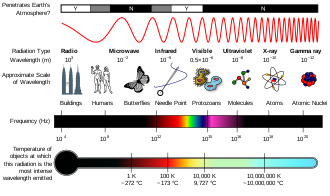Nano-
This article needs additional citations for verification. (January 2020) |
Nano (symbol n) is a unit prefix meaning one billionth. Used primarily with the metric system, this prefix denotes a factor of 10−9 or 0.000000001. It is frequently encountered in science and electronics for prefixing units of time and length.
- Examples
- Three gold atoms lined up are about one nanometer (nm) long.
- If a toy marble were scaled down to one nanometer wide, Earth would scale to about 1 meter (3.3 ft) wide.[1]
- One nanosecond (ns) is about the time required for light to travel 30 cm in air, or 20 cm in an optical fiber.
- One nanometer per second (nm/s) is approximately the speed that a fingernail grows.
The prefix derives from the Greek νᾶνος (Latin nanus), meaning "dwarf". The General Conference on Weights and Measures (CGPM) officially endorsed the usage of nano as a standard prefix in 1960.
When used as a prefix for something other than a unit of measure (as for example in words like "nanoscience"), nano refers to nanotechnology, or means "on a scale of nanometres" (nanoscale).
| Prefix | Base 10 | Decimal | Adoption [nb 1] | |
|---|---|---|---|---|
| Name | Symbol | |||
| quetta | Q | 1030 | 1000000000000000000000000000000 | 2022[2] |
| ronna | R | 1027 | 1000000000000000000000000000 | |
| yotta | Y | 1024 | 1000000000000000000000000 | 1991 |
| zetta | Z | 1021 | 1000000000000000000000 | |
| exa | E | 1018 | 1000000000000000000 | 1975[3] |
| peta | P | 1015 | 1000000000000000 | |
| tera | T | 1012 | 1000000000000 | 1960 |
| giga | G | 109 | 1000000000 | |
| mega | M | 106 | 1000000 | 1873 |
| kilo | k | 103 | 1000 | 1795 |
| hecto | h | 102 | 100 | |
| deca | da | 101 | 10 | |
| — | — | 100 | 1 | — |
| deci | d | 10−1 | 0.1 | 1795 |
| centi | c | 10−2 | 0.01 | |
| milli | m | 10−3 | 0.001 | |
| micro | μ | 10−6 | 0.000001 | 1873 |
| nano | n | 10−9 | 0.000000001 | 1960 |
| pico | p | 10−12 | 0.000000000001 | |
| femto | f | 10−15 | 0.000000000000001 | 1964 |
| atto | a | 10−18 | 0.000000000000000001 | |
| zepto | z | 10−21 | 0.000000000000000000001 | 1991 |
| yocto | y | 10−24 | 0.000000000000000000000001 | |
| ronto | r | 10−27 | 0.000000000000000000000000001 | 2022[2] |
| quecto | q | 10−30 | 0.000000000000000000000000000001 | |
| ||||
Nanometre
[edit]| standard = SI
| quantity = length
| units1 = SI units
| inunits1 = 1×10−9 m
1×103 pm
| units2 = Natural units
| inunits2 = 6.1877×1025 ℓP
18.897 a0
| units3 = imperial/US units
| inunits3 = 3.9370×10−8 in
}}

X-rays have a wavelength ranging from the size of 0.01 nm to 10 nm.
Human fingernails grow at approximately one nanometer per second.[4]
Nanosecond
[edit]A nanosecond (ns) is a unit of time in the International System of Units (SI) equal to one billionth of a second, that is, 1/1000000000 of a second, or 10−9 seconds.
The term combines the SI prefix nano- indicating a 1 billionth submultiple of an SI unit (e.g. nanogram, nanometre, etc.) and second, the primary unit of time in the SI.
A nanosecond is to one second, as one second is to approximately 31.69 years.
A nanosecond is equal to 1000 picoseconds or 1/1000 microsecond. Time units ranging between 10−8 and 10−7 seconds are typically expressed as tens or hundreds of nanoseconds.
Time units of this granularity are commonly found in telecommunications, pulsed lasers, and related aspects of electronics.See also
[edit]References
[edit]- ^ "Size of the Nanoscale". National Nanotechnology Initiative. Retrieved 2020-05-14.
- ^ a b "On the extension of the range of SI prefixes". 18 November 2022. Retrieved 5 February 2023.
- ^ "Metric (SI) Prefixes". NIST.
- ^ "Examples of Nanoscale Objects". ThoughtCo. Retrieved 2024-03-16.
